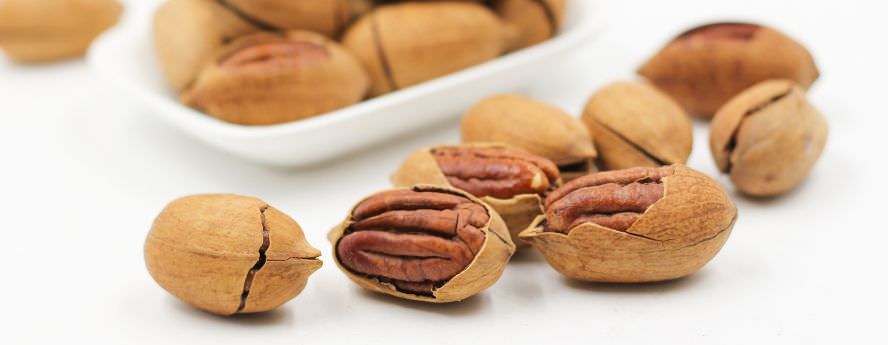
For those who aren’t allergic to nuts but still don’t eat them, it may be time to bring them into your diet. According to the Independent a handful of nuts a day can help keep the doctor and undertaker away, but how true is this and what health benefits do nuts offer us?
Help your digestive system
According to the NHS, nuts are high in fibre and a good substitute for snacks with a high content of saturated fat; fibre is an important part of a healthy diet and adults should aim for at least 30g of fibre a day.
There are two different types of fibre: soluble fibre which dissolves in the water in your digestive system, and insoluble fibre which doesn’t dissolve in water but moves through your gut without being broken down, helping other food move through your digestive system more easily. Nuts contain insoluble fibre which helps keep your bowels healthy and prevent digestive problems.
On BBC Good Food, nutritionist Jo Lewin recommends that we should try to increase the fibre in our diets if we don’t already have enough. However, she suggests doing it slowly as a quick change can cause gas, cramps and bloating.
Lower cholesterol
BBC reports on the findings of a US review of 25 studies looking at the effects of experimental nut diets on blood cholesterol and fat levels which discovered that eating a small quantity of nuts (67g) a day could reduce cholesterol levels by 7.4%.
Peanuts, almonds, pecans, hazelnuts and pistachios could help reduce bad cholesterol by increasing levels of high-density-lipoprotein (good cholesterol) which clears out bad cholesterol.
Heart UK lists nuts in their six super foods for lowering cholesterol, as all nuts are rich in fibre, vitamin E, magnesium, potassium, vegetable protein and unsaturated fats that are heart healthy. They also recommend consuming a handful (30-35g) a day which could have the potential to lower cholesterol by an average of 5%.
Beneficial for Type 2 diabetes
According to Diabetes.co.uk, nuts provide numerous benefits for diabetes sufferers, with studies suggesting nuts might even decrease the risk of type 2 diabetes. Medical News Today also backs up this statement, suggesting that the risk of diabetes could drop by 40% by consuming 20 grams of nuts per day.
Reduce risk of heart disease, stroke and early death
According to a BMC Medicine article that reviewed and analysed 20 studies about nuts, there is evidence showing that nut consumption may reduce the risk of coronary heart disease, stroke, cardiovascular disease, total cancer, and all-cause mortality.
The Telegraph mentions the findings of a study carried out by the Imperial College London which discovered that a handful of nuts a day could cut the risk of heart disease, cancer and early death. Study co-author, Dr Dagfinn Aune, explains that “nuts and peanuts are high in fibre and magnesium” (a mineral which is essential for the normal bone structure in the body), “and polyunsaturated fats - nutrients that are beneficial for cutting cardiovascular disease risk”.
The participants of the study ate a range of nuts and they were all found to protect against heart disease and premature death. Tree nuts were associated with reducing the risk of cancer while peanuts were found to reduce the risk of stroke.
Walnuts contain omega-3 fatty acids. According to WebMD, omega-3 can lower elevated triglyceride levels which, if present in high levels in your blood fat, can increase the risk of heart disease. The omega-3 fatty acids could also help with stiffness and joint pain, boost effects of anti-depressants and are important for the visual and neurological development of infants.
Nevertheless, Diabetes.co.uk warns that salted nuts should be avoided, as consuming too much salt is linked to an increased risk of heart disease.
Other health benefits
Not all nuts are the same and based on their nutrient content they can have different health-related properties:
- Almonds, hazelnuts and pine nuts contain vitamin E. The NHS says vitamin E aids in maintaining healthy skin, eyes and strengthening the body’s natural defence against illness and infection.
- Cashews are rich in magnesium. According to Healthline, magnesium has 9 health benefits: helping with biochemical reactions in your body, boosting exercise performance, fighting depression, benefits against type 2 diabetes, lowering blood pressure, anti-inflammatory benefits, preventing migraines, reducing insulin resistance and improving premenstrual syndrome.
- Pecans are antioxidant-rich which helps prevents the plaque formation that hardens the arteries. They are also a good source of vitamin B3 which helps fight fatigue by helping us access the energy in our food.
- Chestnuts have the lowest fat and calories compared to all nuts, they are rich in starchy carbs, fibre and are a good source of vitamin C. Although they are low in protein, they contain B vitamins including B6.
Nut Allergies
Nut allergies occur when your body’s immune system overreacts to a substance (allergen). According to the NHS, nuts that most commonly cause an allergic reaction are tree nuts (such as walnuts, brazil nuts, almonds and hazelnuts) and peanuts. Patient.info says that approximately 1 in 200 adults and 2 in 100 children in the UK have an allergy to nuts. If you think you have a nut allergy, make an appointment with your GP and they will ask you questions about your symptoms and possibly refer you to an allergy clinic or centre for testing.
Conclusion
Nuts have always been part of the human diet since prehistoric times and research has proven that these have generally a positive effect on our health and several health organisations (including the NHS) recommend a handful of nuts as part of a balanced and healthy diet. However, don’t forget to check if you have a nut allergy before enjoying some of these crunchy and tasty treats.
Disclaimer: The content of this website is provided for informational purposes only and does not substitute the medical advice from a healthcare professional.